The Second International Workshop on Artificial Intelligence for Equity (AI4Eq) “Against Modern Indentured Servitude” was organised in association with IEEE… Read More
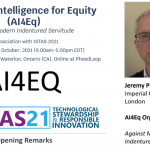


The Second International Workshop on Artificial Intelligence for Equity (AI4Eq) “Against Modern Indentured Servitude” was organised in association with IEEE… Read More
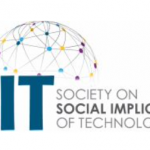
SSIT is seeking candidates for three Board of Governors (BoG) Members-at-Large (2023-2025).
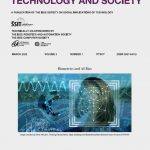
Access Volume 3, Issue 1, 2022 – Special Issue on Biometrics and AI Bias Current Issue (3, 1) Front Cover Publication… Read More
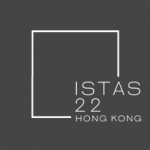
ISTAS is a multi/inter/trans‐disciplinary forum for engineers, policy makers, entrepreneurs, philosophers, researchers, social scientists, technologists, and polymaths to collaborate, exchange experiences, and discuss the social implications of technology.

By failing to attend to the source, disinformation can be stored along with information, making it difficult to distinguish the good penny from the bad penny.

SSIT members have a history of getting into “good trouble” as they encourage IEEE toward more humanistic stances on ethics, transparency, sustainability, and global equity.

Functional democratic governance has five fundamental preconditions: civic dignity, confluent values, epistemic diversity, accessible education, and legitimate consent.

At their March 8, 2022, Board of Governors meeting, The IEEE Society on Social Implications of Technology (SSIT) unanimously passed a motion approving the following statement: “The IEEE Society on Social Implications of Technology actively supports any IEEE initiative that helps the Ukrainian refugees.”

Extracting Accountability: Engineers and Corporate Social Responsibility, by Jessica Smith, investigates how the public accountability of corporations emerges from the… Read More

How can tech organizations of whatever size and industry build more ethical systems? IEEE 7000™ aims to provide organizations with “ethical specs.”

IEEE SSIT might better fit the dictionary’s secondary definition of community, by having a sense of fellowship because we share common goals. If so, what are those goals?
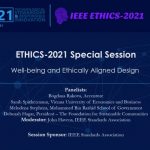
The “Well-being and ethically aligned design” session took place during ETHICS 2021 on 31 October 2021. Moderator: John Havens Click… Read More

Will Griffin presented “Top of the Mind Ethics (TOME)” as a keynote presentation during Ethics 2021 on 28 October 2021…. Read More

This special issue published in cooperation with IEEE Transactions on Technology and Society (December 2021) is dedicated to examining the governance of artificial intelligence (AI) through soft law. These programs are characterized by the creation of substantive expectations that are not directly enforced by government.
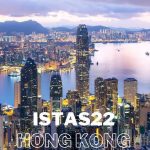
The 2022 IEEE International Symposium on Technology and Society (ISTAS22) will be held November 10-12, 2022, as a hybrid conference in Hong Kong.

IEEE 2089™-2021, Standard for an Age-Appropriate Digital Services Framework Based on the 5Rights Principles for Children is the first in a family of standards that establishes a set of processes that helps enable organizations to make their services age-appropriate.

If it were possible to formulate laws involving vague predicates and adjudicate them, what would be the implications of such minimalist formulations for soft laws and even for “hard” laws? The possible implications are threefold: 1) does possibility imply desirability; 2) does possibility imply infallibility; and 3) does possibility imply accountability? The answer advanced here, to all three questions, is “no.”

The negative effects of technological innovations can be foreseen, and more importantly, mitigated through more intentional and skillful engineering. Systematic efforts to address these impacts remain peripheral to the engineering profession. The Canada-based Engineering Change Laboratory has identified a set of behaviors that take a value sensitive approach to the practice and culture of engineering.
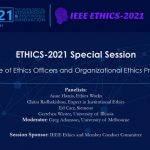
The Role of Ethics Officers and Organizational Ethics Programs panel, took place on 30 October 2021 within Ethics 2021. Featuring… Read More

Katina Michael has been recognized with a 2021 IEEE Standards Association (IEEE SA) Managing Director’s Special Recognition Award “in appreciation of her leadership in advancing age-appropriate design standardization” in the creation of IEEE Standard 2089.